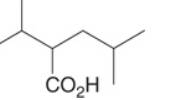
ORGANIC CHEMISTRY
5th Edition
ISBN: 9781259977596
Author: SMITH
Publisher: MCG
expand_more
expand_more
format_list_bulleted
Concept explainers
Textbook Question
Chapter 20, Problem 20.65P
Design a synthesis of each compound from alcohols having four carbons or fewer as the only organic starting materials. You may use any other inorganic reagents you choose.
a.  b.
b.  c.
c. 
Expert Solution & Answer
Want to see the full answer?
Check out a sample textbook solution
Students have asked these similar questions
5.
9
alekscgi/x/lsl.exe/1o_u-IgNslkr7j8P3jH-IQs_pBanHhvlTCeeBZbufu BYTI0Hz7m7D3ZS18w-nDB10538ZsAtmorZoFusYj2Xu9b78gZo-
O States of Matter
Sketching a described thermodynamic change on a phase diagram
0/5
The pressure on a sample of pure X held at 47. °C and 0.88 atm is increased until the sample condenses. The pressure is then held constant and the
temperature is decreased by 82. °C. On the phase diagram below draw a path that shows this set of changes.
pressure (atm)
3-
200
temperature (K)
Explanation
Chick
Q Sownch
Chapter 20 Solutions
ORGANIC CHEMISTRY
Ch. 20 - Prob. 20.1PCh. 20 - Which carbonyl groups in the anticancer drug taxol...Ch. 20 - Prob. 20.3PCh. 20 - Problem 20.4 What alcohol is formed when each...Ch. 20 - Problem 20.5 What aldehyde or ketone is needed to...Ch. 20 - Prob. 20.6PCh. 20 - Problem 20.7 Draw the products formed when is...Ch. 20 - Problem 20.8 Draw the products formed (including...Ch. 20 - Prob. 20.9PCh. 20 - Problem 20.10 Draw a stepwise mechanism for the...
Ch. 20 - Prob. 20.11PCh. 20 - Problem 20.12 Draw the products formed from ...Ch. 20 - Prob. 20.13PCh. 20 - Prob. 20.14PCh. 20 - Prob. 20.15PCh. 20 - Problem-20.16 Review the oxidation reactions using...Ch. 20 - Problem-20.17 Write the step(s) needed to convert ...Ch. 20 - Problem-20.18 Oct-1-yne reacts rapidly with ,...Ch. 20 - Prob. 20.19PCh. 20 - Prob. 20.20PCh. 20 - Problem 20.21 Draw the product of each reaction.
...Ch. 20 - Problem 20.22 Draw the products (including...Ch. 20 - Problem 20.23 What Grignard reagent and carbonyl...Ch. 20 - Problem 20.24 Linalool (the Chapter 9 opening...Ch. 20 - Problem 20.25 What Grignard reagent and carbonyl...Ch. 20 - Prob. 20.26PCh. 20 - Draw the products formed when each compound is...Ch. 20 - Problem 20.28 What ester and Grignard reagent are...Ch. 20 - Prob. 20.29PCh. 20 - Problem 20.30 What reagent is needed to convert ...Ch. 20 - Prob. 20.31PCh. 20 - What carboxylic acid formed from each alkyl halide...Ch. 20 - Prob. 20.33PCh. 20 - Problem 20.34 Draw the product when each compound...Ch. 20 - Problem 20.35 Synthesize each compound from...Ch. 20 - Prob. 20.36PCh. 20 - 20.37 Devise a synthesis of each alcohol from...Ch. 20 - 20.38 Draw the products formed when pentanal is...Ch. 20 - 20.39 Draw the product formed when is treated...Ch. 20 - The stereochemistry of the products of reduction...Ch. 20 - Prob. 20.41PCh. 20 - 20.42 Draw the products or each reduction...Ch. 20 - Prob. 20.43PCh. 20 - 20.44 Draw all stereoisomers formed in each...Ch. 20 - Prob. 20.45PCh. 20 - 20.46 Treatment of ketone A with ethynylithium...Ch. 20 - 20.47 Explain why metal hydride reduction gives an...Ch. 20 - Prob. 20.48PCh. 20 - 20.49 Identify the lettered compounds in the...Ch. 20 - Prob. 20.50PCh. 20 - 20.51 Draw a stepwise mechanism for the following...Ch. 20 - 20.52 Draw a stepwise mechanism for the following...Ch. 20 - Prob. 20.53PCh. 20 - 20.54 Draw a stepwise mechanism for the following...Ch. 20 - Prob. 20.55PCh. 20 - Prob. 20.56PCh. 20 - 20.57 What ester and Grignard reagent are needed...Ch. 20 - 20.58 What organolithium reagent and carbonyl...Ch. 20 - 20.59 What epoxide and organometallic reagent are...Ch. 20 - Prob. 20.60PCh. 20 - 20.61 Propose two different methods to synthesize...Ch. 20 - 20.62 Synthesize each compound from cyclohexanol...Ch. 20 - 20.63 Convert propan-2-ol into each compound....Ch. 20 - 20.64 Convert benzene into each compound. You may...Ch. 20 - 20.65 Design a synthesis of each compound from...Ch. 20 - 20.66 Synthesize each compound from the given...Ch. 20 - Prob. 20.67PCh. 20 - Prob. 20.68PCh. 20 - 20.69 An unknown compound A (molecular formula )...Ch. 20 - 20.70 Treatment of compound C (molecular formula )...Ch. 20 - 20.71 Treatment of compound E (molecular formula )...Ch. 20 - 20.72 Reaction of butanenitrile () with methyl...Ch. 20 - 20.73 Treatment of isobutene with forms a...Ch. 20 - 20.74 Draw a stepwise mechanism for the following...Ch. 20 - Prob. 20.75PCh. 20 - 20.76 Lithium tri-sec-butylborohydride, also known...Ch. 20 - Prob. 20.77PCh. 20 - Prob. 20.78PCh. 20 - Prob. 20.79PCh. 20 - 20.80 Draw a stepwise mechanism for the following...Ch. 20 - Prob. 20.81P
Knowledge Booster
Learn more about
Need a deep-dive on the concept behind this application? Look no further. Learn more about this topic, chemistry and related others by exploring similar questions and additional content below.Similar questions
- 0+ aleksog/x/lsl.exe/1ou-lgNgkr7j8P3H-IQs pBaHhviTCeeBZbufuBYTOHz7m7D3ZStEPTBSB3u9bsp3Da pl19qomOXLhvWbH9wmXW5zm O States of Matter Sketching a described thermodynamic change on a phase diagram 0/5 Gab The temperature on a sample of pure X held at 0.75 atm and -229. °C is increased until the sample sublimes. The temperature is then held constant and the pressure is decreased by 0.50 atm. On the phase diagram below draw a path that shows this set of changes. F3 pressure (atm) 0- 0 200 Explanation temperature (K) Check F4 F5 ☀+ Q Search Chill Will an 9 ENG F6 F7 F8 F9 8 Delete F10 F11 F12 Insert PrtSc 114 d Ararrow_forwardx + LEKS: Using a phase diagram a X n/alekscgi/x/lsl.exe/10_u-IgNsikr7j8P3jH-IQs_pBan HhvlTCeeBZbufu BYTI0Hz7m7D3ZcHYUt80XL-5alyVpw ○ States of Matter Using a phase diagram to find a phase transition temperature or pressure Use the phase diagram of Substance X below to find the melting point of X when the pressure above the solid is 1.1 atm. pressure (atm) 16 08- solid liquid- 0 200 400 gas 600 temperature (K) Note: your answer must be within 25 °C of the exact answer to be graded correct. × 5arrow_forwardS: Using a phase diagram leksogi/x/sl.exe/1ou-IgNs kr 7j8P3jH-IQs_pBan HhvTCeeBZbufuBYTI0Hz7m7D3ZdHYU+80XL-5alyVp O States of Matter Using a phase diagram to find a phase transition temperature or pressure se the phase diagram of Substance X below to find the boiling point of X when the pressure on the liquid is 1.6 atm. pressure (atm) 32- 16- solid liquid 0. gas 100 200 temperature (K) 300 Note: your answer must be within 12.5 °C of the exact answer to be graded correct. 10 Explanation Check § Q Search J 2025 McGraw Hill LLC. All Rights Researrow_forward
- 151.2 254.8 85.9 199.6 241.4 87.6 242.5 186.4 155.8 257.1 242.9 253.3 256.0 216.6 108.7 239.0 149.7 236.4 152.1 222.7 148.7 278.2 268.7 234.4 262.7 283.2 143.6 QUESTION: Using this group of data on salt reduced tomato sauce concentration readings answer the following questions: 1. 95% Cl Confidence Interval (mmol/L) 2. [Na+] (mg/100 mL) 3. 95% Na+ Confidence Interval (mg/100 mL)arrow_forwardResults Search Results Best Free Coursehero Unloc xb Success Confirmation of Q x O Google Pas alekscgi/x/lsl.exe/1o_u-IgNslkr 7j8P3jH-IQs_pBanHhvlTCeeBZbufu BYTI0Hz7m7D3ZcHYUt80XL-5alyVpwDXM TEZayFYCavJ17dZtpxbFD0Qggd1J O States of Matter Using a phase diagram to find a phase transition temperature or pressure Gabr 3/5 he pressure above a pure sample of solid Substance X at 101. °C is lowered. At what pressure will the sample sublime? Use the phase diagram of X below to nd your answer. pressure (atm) 24- 12 solid liquid gas 200 400 temperature (K) 600 ote: your answer must be within 0.15 atm of the exact answer to be graded correct. atm Thanation Check © 2025 McGraw Hill LLC. All Rights Reserved. Terms of Use | Privacy Center I Q Search L³ ملةarrow_forward301.7 348.9 193.7 308.6 339.5 160.6 337.7 464.7 223.5 370.5 326.6 327.5 336.1 317.9 203.8 329.8 221.9 331.7 211.7 309.6 223.4 353.7 334.6 305.6 340.0 304.3 244.7 QUESTION: Using this group of data on regular tomato sauce concentration readings answer the following questions: 1. 95% Cl Confidence Interval (mmol/L) 2. [Na+] (mg/100 mL) 3. 95% Na+ Confidence Interval (mg/100 mL)arrow_forward
- Search Results Search Results Best Free Coursehero Unlo x b Success Confirmation of Q aleks.com/alekscgi/x/sl.exe/10_u-lgNslkr7j8P3jH-IQs_pBan HhvlTCeeBZbufu BYTIOHz7m7D3ZcHYUt80XL-5alyVpwDXM TEZayFYCav States of Matter Using a phase diagram to find a phase transition temperature or pressure Use the phase diagram of Substance X below to find the temperature at which X turns to a gas, if the pressure above the solid is 3.7 atm. pressure (atm) 0. 32- 16 solid liquid gas 200 temperature (K) Note: your answer must be within 20 °C of the exact answer to be graded correct. Дос Xarrow_forwardConsider the reaction below to answer the following questions: Acetoacetic ester can be prepared by the Claisen self-condensation reaction of ethyl acetate. 1. NaOEt, EtOH H&C OCH CH3 2 H30 H3C CH2 OCH2CH3 A. Write the complete stepwise mechanism for this reaction. Show all electron flow with arrows and draw all intermediate structures. B. Ethyl acetate can be prepared from ethanol as the only organic starting material. Show all reagents and structures for all intermediates in this preparation. C. Give the structures of the ester precursors for the following Claisen condensation product and formulate the reaction. OEtarrow_forwardUse the phase diagram of Substance X below to find the temperature at which X turns to a gas, if the pressure above the solid is 3.7 atm. pressure (atm) 32 16 solid liquid gas 0 0 200 temperature (K) Note: your answer must be within 20 °C of the exact answer to be graded correct. Шос ☑ كarrow_forward
- Starting from bromoethane, how could you prepare the following compounds: a. Ethanol. b. Acetaldehyde f. Acetone. e. 2-Propanol i. Acetoacetic ester. d. 2-Bromoacetic acid. c. Acetic acid g. Acetamide. j. Ethylmalonate k. Gama ketoacid. h. Ethyl magnesium bromide.arrow_forward- The pressure above a pure sample of solid Substance X at 60. °C is raised. At what pressure will the sample melt? Use the phase diagram of X below to find your answer. pressure (atm) 02 0.4 solid Hliquid gas 0 0 200 400 600 temperature (K) Note: your answer must be within 0.025 atm of the exact answer to be graded correct. ☐ atmarrow_forward15. What is the order of decreasing reactivity towards nucleophilic acyl substitution for the carboxylic acid derivatives? (most reactive first) 0 O H3C COC CH3 H₂C C N(CH3)2 H3C C OCH3 A. a. I, 11, 111, b. I, III, IV, II C. II, IV, III, I ° (CH3)2CH C OCH3 IV d. II, I, III, IV B. R COCR 0 0 0 13= RC NH2 RC OR RC CI === IV a. I, III, II, IV b. II, III, I, IV C. III, II, I, IV d. IV, I, III, IIarrow_forward
arrow_back_ios
SEE MORE QUESTIONS
arrow_forward_ios
Recommended textbooks for you
 Organic ChemistryChemistryISBN:9781305580350Author:William H. Brown, Brent L. Iverson, Eric Anslyn, Christopher S. FootePublisher:Cengage Learning
Organic ChemistryChemistryISBN:9781305580350Author:William H. Brown, Brent L. Iverson, Eric Anslyn, Christopher S. FootePublisher:Cengage Learning Chemistry for Today: General, Organic, and Bioche...ChemistryISBN:9781305960060Author:Spencer L. Seager, Michael R. Slabaugh, Maren S. HansenPublisher:Cengage Learning
Chemistry for Today: General, Organic, and Bioche...ChemistryISBN:9781305960060Author:Spencer L. Seager, Michael R. Slabaugh, Maren S. HansenPublisher:Cengage Learning Organic Chemistry: A Guided InquiryChemistryISBN:9780618974122Author:Andrei StraumanisPublisher:Cengage Learning
Organic Chemistry: A Guided InquiryChemistryISBN:9780618974122Author:Andrei StraumanisPublisher:Cengage Learning

Organic Chemistry
Chemistry
ISBN:9781305580350
Author:William H. Brown, Brent L. Iverson, Eric Anslyn, Christopher S. Foote
Publisher:Cengage Learning

Chemistry for Today: General, Organic, and Bioche...
Chemistry
ISBN:9781305960060
Author:Spencer L. Seager, Michael R. Slabaugh, Maren S. Hansen
Publisher:Cengage Learning

Organic Chemistry: A Guided Inquiry
Chemistry
ISBN:9780618974122
Author:Andrei Straumanis
Publisher:Cengage Learning
Nomenclature: Crash Course Chemistry #44; Author: CrashCourse;https://www.youtube.com/watch?v=U7wavimfNFE;License: Standard YouTube License, CC-BY